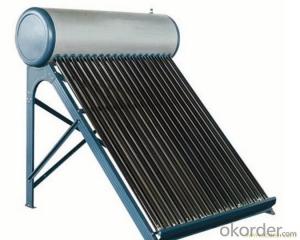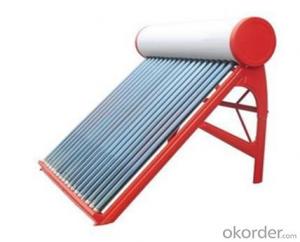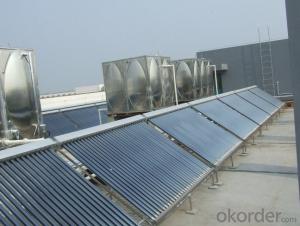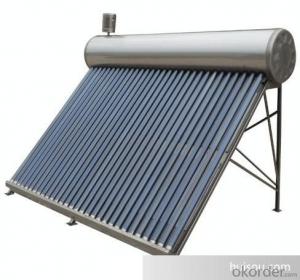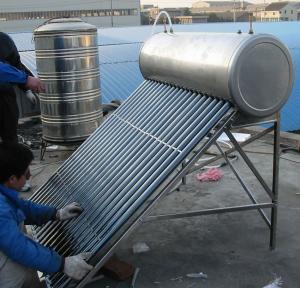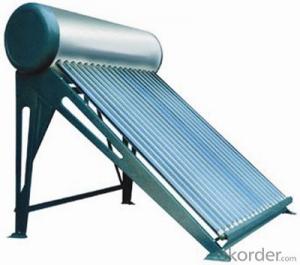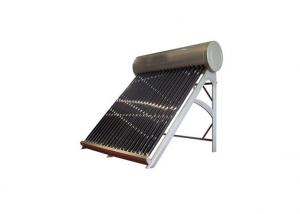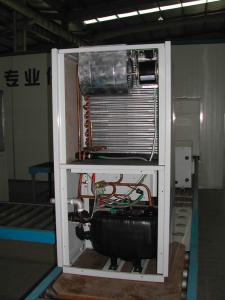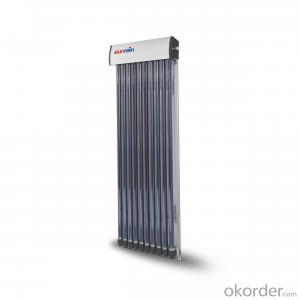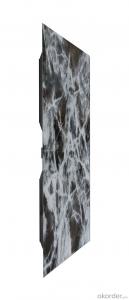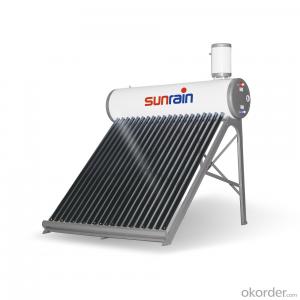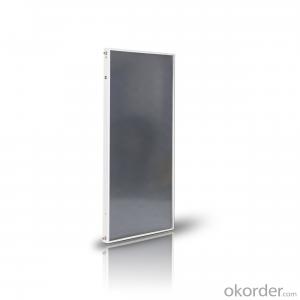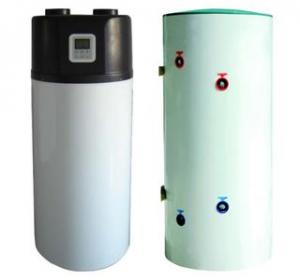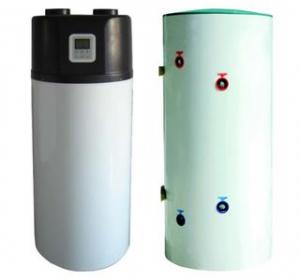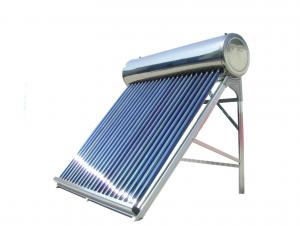Vacuum 28 Tube Solar Collector China Top Supplier
- Loading Port:
- China main port
- Payment Terms:
- TT OR LC
- Min Order Qty:
- 10 set
- Supply Capability:
- 10000 set/month
OKorder Service Pledge
OKorder Financial Service
You Might Also Like
Introduction of Non-Pressure Solar Water Heater:
Non-pressure Solar Heater is one of the most economical solar water heating device with pretty high efficiency at the same time. It consists of hot water storage tank, solar vacuum tubes with mouth plug in storage tank, and bracket supporting tank and tubes.When cold water in evacuated tubes is heated with solar irradiation, as the specific gravities of hot water and cold water are different, hotter water goes upward to storage tank and colder water goes downward to glass tubes. through this continuous circulation, the cold water in storage tank will be gradually heated till sunset.
Solar water heaters working principle
1. The solar collector absorbs solar energy and transmits it to the solar water heater tank through circulation
2. When the temperature of the collector reaches the set value, the controller starts the circulation pump automatically
3. The circulation pump makes heat-conducting liquid circulate automatically
4. The heat-conducting liquid transfers heat to water by lower heat exchanger in the water tank.
5. When the temperature difference between solar collector and heat pipe solar water heaters tank doesn't reach the set value, the circulation pump will be shut automatically
6. In case the temperature of the water tank does not reach Tmax, Electric Heating Element will start to work automatically
Solar water heaters working station component:
1. Operating screen
2. Manometer
3. Pump speed adjust switches
4. Temperature difference circulation pump
5. Flow rate indicator
Solar water heaters specification:
Description | solar water heaters |
Material of out manifold | 0.55mm thickness color steel/ fluorine carbon steel |
Material of inner tank | Food grade 2.0 mm thickness SUS304 stainless steel |
Tank insulating layer | 40mm 45kg/m³ high-density polyurethane foamed |
Inlet and outlet hole | Male G1'' |
Max pressure | 0.6 Mpa |
Solar collector tube | 3.3 Borosilicate glass with N/Al coating |
Thickness of glass tube | 1.6mm |
Vacuum tube tightness | P≤0.005 Pa |
Absorption | as=0.93-0.96 (AM1.5) |
Emission ratio | εh=0.04-0.06 (80C±5C) |
Idle sunning property parameters | Y=220~260m2.C/KW |
Average heat loss coefficient | ULT=0.6~0.7W/(m2.C) |
Bracket: | 2.0mm thickness aluminum alloy |
Tank weight | 75KGS |
Tank size | 560mm Dia x 1810mm Height |
Tank capacity | 300L |
Solar collector | 2pcs 58x1800x15tube solar collector |
Absorber area | 2.811 m² |
Working station | SP116 working station |
Heat exchanger length | Upper:12m, Underside:18m |
Solar water heaters details show:
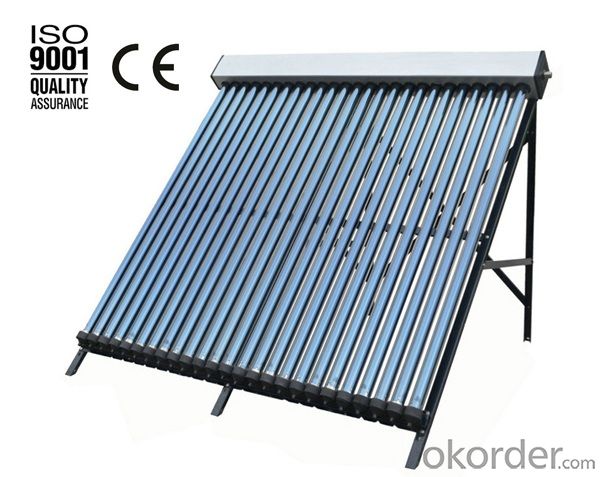
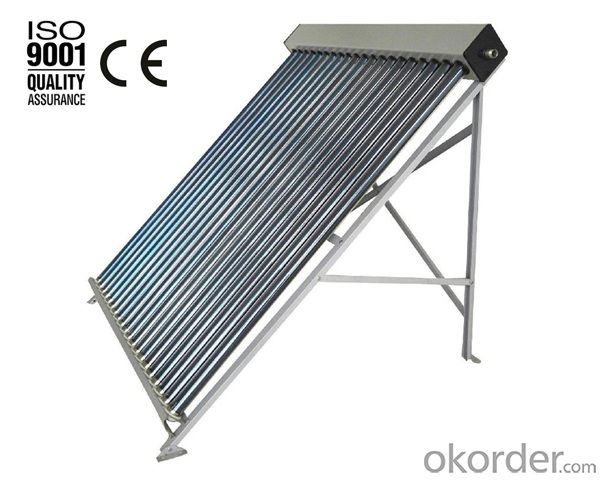
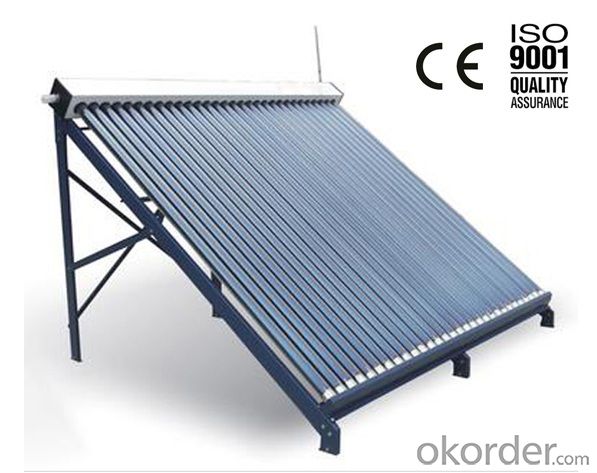
Benefits of this kind of solar water heaters:
1. Prolong the life of your existing water heater
2.Costs less than an electric, gas or oil water heater
3.No maintenance required
4.Lasts longer than a traditional hot water heater
5.Reduce your water heating costs
- Q:How does the size of a solar water heater system affect its performance?
- The size of a solar water heater system directly affects its performance. A larger system with a greater surface area for solar absorption can generate more heat and produce hot water more efficiently. It can also accommodate a higher demand for hot water, making it suitable for larger households or commercial applications. Conversely, a smaller system may struggle to meet the hot water needs of a larger household or may take longer to heat the water. Therefore, choosing the right size of a solar water heater system is crucial to ensure optimal performance and efficiency.
- Q:Can a solar water heater be used in areas with limited access to energy-efficient appliances?
- Yes, a solar water heater can be used in areas with limited access to energy-efficient appliances. Solar water heaters are designed to utilize sunlight to heat water, reducing the reliance on electricity or gas. They can be a viable option for areas with limited access to energy-efficient appliances as they are cost-effective, environmentally friendly, and can provide hot water even in remote locations.
- Q:What is the efficiency rating of a solar water heater?
- The efficiency rating of a solar water heater can vary depending on various factors such as the design, size, location, and climate. However, on average, solar water heaters have an efficiency rating ranging from 70% to 90%.
- Q:Can a solar water heater be used in areas with limited access to electricity grid connections?
- Yes, a solar water heater can be used in areas with limited access to electricity grid connections. Solar water heaters utilize the energy from the sun to heat water, eliminating the need for electricity. They are a sustainable and cost-effective solution for areas without reliable access to the electricity grid, providing hot water for various purposes.
- Q:Are there any government incentives available for installing a solar water heater?
- Yes, there are government incentives available for installing a solar water heater. Many countries, states, and municipalities offer various incentives such as tax credits, grants, rebates, and low-interest loans to encourage the adoption of renewable energy technologies like solar water heaters. These incentives aim to reduce dependence on fossil fuels, lower greenhouse gas emissions, and promote sustainable energy solutions. It is advisable to check with local government agencies or energy departments to explore specific incentives available in your area.
- Q:Are there any specific maintenance requirements for the solar collector?
- Yes, there are specific maintenance requirements for a solar collector. Regular maintenance is necessary to ensure the optimal performance and longevity of the system. Some of the key maintenance tasks include: 1. Cleaning: The solar collector should be cleaned periodically to remove any dirt, dust, or debris that may accumulate on the surface. This can be done using a soft brush or cloth and water. Avoid using abrasive materials or chemicals that could damage the collector. 2. Inspecting for damage: Regularly inspect the collector for any signs of damage, such as cracks or leaks. If any issues are detected, they should be repaired promptly to prevent further damage and ensure the efficiency of the system. 3. Checking fluid levels: If the solar collector uses a liquid-based heat transfer system, it is important to check the fluid levels regularly. The fluid should be at the recommended level, and if necessary, it should be topped up or replaced according to the manufacturer's instructions. 4. Monitoring performance: Keep track of the system's performance, including the temperature of the collector and the amount of energy being generated. Any significant changes or declines in performance should be investigated to identify and resolve any potential issues. 5. Snow and ice removal: In areas with cold climates, it may be necessary to remove snow or ice from the solar collector's surface during winter. This can be done gently using a soft broom or by using a snow rake specifically designed for solar panels. It is recommended to consult the manufacturer's guidelines and recommendations for specific maintenance requirements for your solar collector model. Additionally, professional maintenance services are available for more extensive inspections and maintenance tasks.
- Q:Can a solar water heater be used with different types of water tanks?
- Yes, a solar water heater can be used with different types of water tanks. The design and installation of a solar water heater can be customized to accommodate various types of water tanks, such as conventional storage tanks or tankless systems. It is important to ensure proper compatibility and sizing to optimize the efficiency and performance of the solar water heating system.
- Q:Can a solar water heater be used with a well or borehole system?
- Yes, a solar water heater can be used with a well or borehole system. In fact, it can be a highly efficient and cost-effective solution for heating water in areas where access to electricity may be limited or expensive. The solar water heater utilizes energy from the sun to heat water, and this energy can be harnessed regardless of the water source. Whether the water comes from a well, borehole, or any other source, it can be pumped into the solar water heater system to be heated by the sun's rays. This can provide a sustainable and environmentally friendly way to heat water for various purposes, including bathing, washing, and even space heating. Additionally, by using a solar water heater with a well or borehole system, one can reduce their reliance on traditional energy sources and potentially save on energy costs in the long run.
- Q:Air energy water heater and solar water heater which is good
- The air relative to the solar water heater, the biggest advantage is to make up for the solar water heater can not produce efficiency all day long shortcomings, one night can only rely on the solar water heater water tank insulation effect to the temperature of the hot water has been saved to the night. After all, most people work during the day and go to bed at night.
- Q:Can a solar water heater be integrated with an existing water heating system?
- Yes, a solar water heater can be integrated with an existing water heating system. By installing the solar water heater alongside the existing system, the solar energy can be used to preheat the water before it enters the traditional water heater, reducing the energy consumption and costs. This integration allows for a more efficient and sustainable water heating solution.
1. Manufacturer Overview |
|
|---|---|
| Location | |
| Year Established | |
| Annual Output Value | |
| Main Markets | |
| Company Certifications | |
2. Manufacturer Certificates |
|
|---|---|
| a) Certification Name | |
| Range | |
| Reference | |
| Validity Period | |
3. Manufacturer Capability |
|
|---|---|
| a)Trade Capacity | |
| Nearest Port | |
| Export Percentage | |
| No.of Employees in Trade Department | |
| Language Spoken: | |
| b)Factory Information | |
| Factory Size: | |
| No. of Production Lines | |
| Contract Manufacturing | |
| Product Price Range | |
Send your message to us
Vacuum 28 Tube Solar Collector China Top Supplier
- Loading Port:
- China main port
- Payment Terms:
- TT OR LC
- Min Order Qty:
- 10 set
- Supply Capability:
- 10000 set/month
OKorder Service Pledge
OKorder Financial Service
Similar products
New products
Hot products
Related keywords
